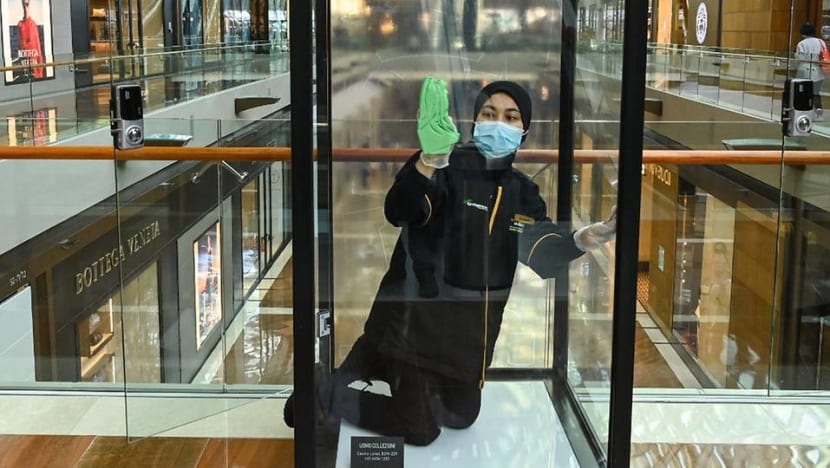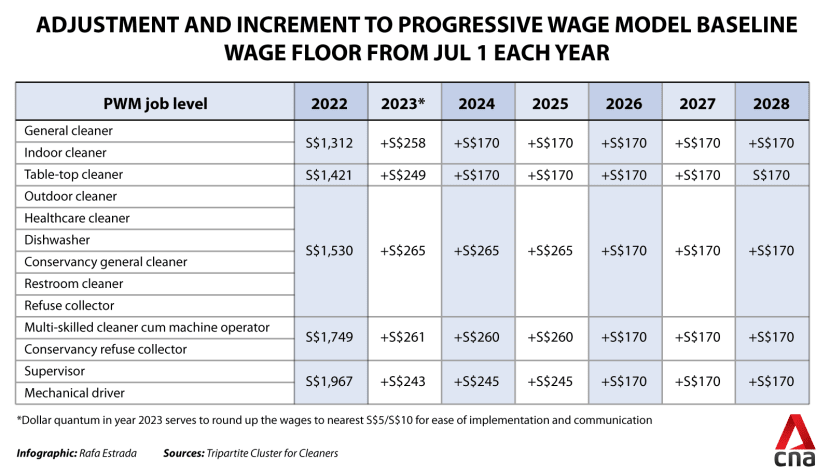Cleaners’ wages to rise from 2023 amid COVID-19 labour crunch
The base wages of cleaners who are Singaporeans or permanent residents will go up each year over six years under the progressive wage model.

A cleaner wipes a display case at a shopping mall in Singapore. (Photo: AFP)
SINGAPORE: The wages of cleaners will go up each year over six years from 2023, after proposals by the Tripartite Cluster for Cleaners (TCC) were accepted by the Government on Monday (Jun 7).
Under the progressive wage model (PWM), the base salaries of cleaners who are Singaporeans or permanent residents will go up to between S$1,570 and S$2,210 in 2023. The amount will increase by at least S$170 each year until 2028.
A full-time general or indoor cleaner, for instance, will qualify for a monthly salary of S$1,570 in July 2023. This is after a pay rise of S$258 - a nearly 20 per cent increase from the recommended salary of S$1,312 in 2022.
In comparison, the PWM recommended annual increments from Jul 1, 2020 to Jun 30, 2023 was 3 per cent a year.
The base pay of cleaners has risen gradually over the years and is now at S$1,236. It is due to rise to S$1,274 this July and to S$1,312 in July 2022 under the PWM.

With the new wage adjustments, other categories of workers like restroom cleaners and healthcare cleaners will have to be paid at least S$1,795.
Higher-skilled workers such as supervisors and mechanical drivers will have a wage floor of S$2,210.
The move is expected to benefit about 40,000 resident cleaners employed by more than 1,500 cleaning businesses.
"This is a timely and necessary review to recognise the importance and higher value of work shouldered by our cleaners, particularly during the COVID-19 pandemic," said TCC and the National Trades Union Congress (NTUC) in a joint media release on Monday.
The progressive wage model is designed to raise the salaries of lower-wage workers by upgrading their skills and increasing their productivity. Since 2014, it has been a licensing condition for cleaning companies.
According to NTUC, a survey conducted late last year found that nearly all respondents indicated that the job of cleaners has become more important, and 95 per cent said they should be paid more.
This is also the first wage review that takes reference from the Tripartite Workgroup on Lower-Wage Workers’ objective to ensure that wage growth is “ambitious enough to close the gap with workers earning median wages”.
The workgroup was launched in October last year to review the salaries of low-wage workers and improve their well-being. Its goals include ensuring that wage increases in sectors covered by the progressive wage model continue to outpace median wage growth, as well as expanding the number of occupations covered by the progressive wage model.
Singapore’s median wage in 2020 was S$4,534.
READ: Government launches work group to look into wages, welfare of low-wage workers
“In this pandemic, most of our workers, or cleaners are out there on the frontline ... we really need to show a commitment and our gratitude for what they've done, keeping Singapore safe," said Member of Parliament Mohd Fahmi Aliman (PAP-Marine Parade), who is a member of the workgroup.
"I strongly urge all stakeholders to play a part in ensuring that our essential services workers in the environmental service industry can work with dignity."
MORE TRAINING REQUIREMENTS BEYOND 2025
It was also announced on Monday that training guidelines requiring cleaners to get at least two Workforce Skills Qualification (WSQ) Certificates in Environmental Cleaning Modules or the equivalent have to be met by December next year.
“This will help cleaners ensure their personal safety when carrying out cleaning tasks, especially with the increased cleaning demands and standards brought on by COVID-19,” said TCC and NTUC.
Beyond 2025, the number of WSQ modules general cleaners need to complete will be increased to three, while those in higher job rungs must complete four modules.
Chairman of the TCC and NTUC assistant director-general Zainal Sapari said the proposed wage ladder comes after extensive consultations with industry stakeholders. He said the six-year schedule of increases provides greater certainty to service providers and service buyers to price and award cleaning contracts.
The "aggressive wage increase" not only reflects the value of the work cleaners do, it also attempts to narrow the gap between their wages and the salaries of other workers, said Mr Zainal.
When asked if there was a target percentage of the median wage that cleaners' pay should eventually be pegged to, he said that this is "premature" but that the aim is for the annual wage increase to be higher than the median annual hike so that the wage gap can be narrowed.
According to NTUC, with the new wage schedule, the compound annual growth rate of a general cleaner's pay will be 10.7 per cent from 2023 to 2028. From Ministry of Manpower (MOM) statistics, the annualised total wage change in Singapore from 2014 to 2019 was 4.1 per cent.
"We want to attract a younger workforce into this industry. We want this to be a possible career that they can consider, compared to going into the gig economy," Mr Zainal added.
President of the Environmental Management Association of Singapore (EMAS), Mr Tony Chooi, said he hopes that being a cleaner will not be a "job of last resort".
"We are trying all ways to see how we are able to build the industry into something that is more attractive," he said.
Responding to another question on whether the higher wages will result in cleaning companies turning to more foreign workers, Mr Zainal said that this should not happen as the industry is regulated by the Dependency Ratio Ceiling which is essentially a quota for hiring Singaporean workers.
TCC co-chair Jeffrey Chua, who represents the Singapore National Employers Federation (SNEF), said that with higher wage costs, service buyers should "seriously consider" outcome-based contracts rather than headcount based contracts, and invest in technology with cleaning companies to improve productivity.
"We also think short-term contracts will not encourage this behaviour. Hence, that's why we have announced the six-year runway to allow service buyers and service providers to invest in technology," he said.
The TCC includes representatives from SNEF, the labour movement, EMAS, service buyers and government agencies including MOM and the National Environment Agency (NEA).
MOM, SkillsFuture Singapore, Workforce Singapore and NEA said in a joint press release on Monday that the Government has accepted the recommendations for the six-year schedule of wage increases and more mandatory training requirements.
"I am glad that many of us are more aware of the value of work our cleaners do. It is only apt that we recognise their contributions. Pandemic or not, uplifting the lives of our lower-wage workers matters to us," said NTUC secretary-general Ng Chee Meng in a Facebook post after the announcement.












